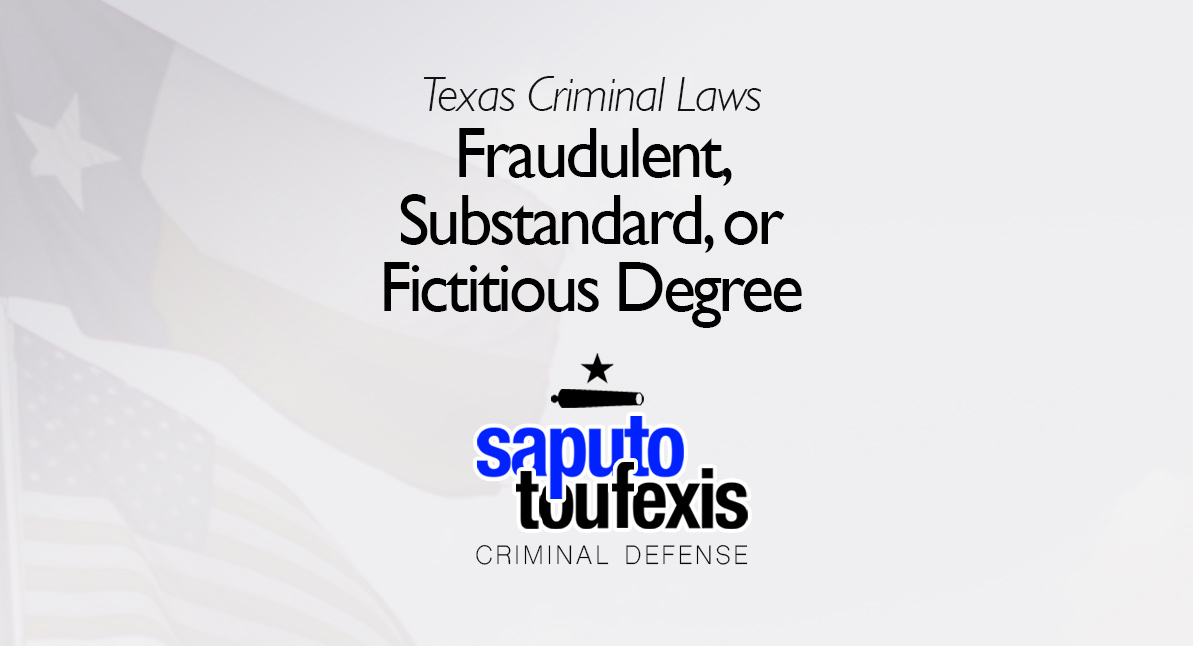The Texas Fraudulent, Substandard, or Fictitious Degree law prohibits you from using a fake college degree or one that doesn’t belong to you in an attempt to get a job or for some other advantage.
FAQs about the
Fraudulent, Substandard, or Fictitious Degree law in Texas
- What is the current Texas law about Fraudulent, Substandard, or Fictitious Degree?
- What is the penalty for a Texas Fraudulent, Substandard, or Fictitious Degree offense?
- How can I be charged with a Fraudulent, Substandard, or Fictitious Degree offense in Texas?
- What is the statute of limitations for Fraudulent, Substandard, or Fictitious Degree in Texas?
- Can you get probation for Fraudulent, Substandard, or Fictitious Degree in Texas?
- What level of crime is Fraudulent, Substandard, or Fictitious Degree in Texas?
An important limitation to this offense, as described below, is that it only applies to a “postsecondary” degree, so it does not include a high school diploma.
Have you been charged with Fraudulent, Substandard, or Fictitious Degree? Contact us today to discuss legal representation.
or Text or Call (888) 239-9305
The Texas legislature codified this criminal offense in Texas Penal Code Section 32.52. The legislature did not update this law in 2025. In fact, this law has not been amended since its enactment in 2005.
The Penal Code classifies the Texas Fraudulent, Substandard, or Fictitious Degree law under Title 7 “Offenses Against Property,” Chapter 32 “Fraud.” Learn more about the Texas offense of Fraudulent, Substandard, or Fictitious Degree below.
What is the current Texas law about Fraudulent, Substandard, or Fictitious Degree?
AV Preeminent Texas lawyer Paul Saputo provides the current law defining Fraudulent, Substandard, or Fictitious Degree in Penal Code Section §32.52, as follows:[1]
(b) A person commits an offense if the person:
(1) uses or claims to hold a postsecondary degree that the person knows:
(A) is a fraudulent or substandard degree;
(B) is fictitious or has otherwise not been granted to the person; or
(C) has been revoked; and
(2) uses or claims to hold that degree:
(A) in a written or oral advertisement or other promotion of a business; or
(B) with the intent to:
(i) obtain employment;
(ii) obtain a license or certificate to practice a trade, profession, or occupation;
(iii) obtain a promotion, a compensation or other benefit, or an increase in compensation or other benefit, in employment or in the practice of a trade, profession, or occupation;
(iv) obtain admission to an educational program in this state; or
(v) gain a position in government with authority over another person, regardless of whether the actor receives compensation for the position.
What is the penalty for a Texas Fraudulent, Substandard, or Fictitious Degree offense?
A conviction for Fraudulent, Substandard, or Fictitious Degree in Texas is punished as a Class B misdemeanor,[2] with a maximum possible fine under Texas state law of up to $2,000 and jail time of up to 180 days.
How can I be charged with a Fraudulent, Substandard, or Fictitious Degree offense in Texas?
You can be charged with Fraudulent, Substandard, or Fictitious Degree in Texas if the state’s attorneys believe that each of the elements of §32.52(b) as described in the section above have been met.
What is the statute of limitations for Fraudulent, Substandard, or Fictitious Degree in Texas?
As a misdemeanor, Fraudulent, Substandard, or Fictitious Degree charges have a two-year limitations period.[3]
Can you get probation for Fraudulent, Substandard, or Fictitious Degree in Texas?
The Texas Code of Criminal Procedure allows both judges and juries to grant probation for Fraudulent, Substandard, or Fictitious Degree, and judges are also allowed to accept deferred adjudication plea deals.[4]
What level of crime is Fraudulent, Substandard, or Fictitious Degree in Texas?
The Penal Code classifies the punishment for Fraudulent, Substandard, or Fictitious Degree as a Class B misdemeanor.
Learn more about the penalty range for this offense in the section above.
Legal References:
^1. Texas Penal Code §32.52. This law is current as of 2025.^2. Texas Penal Code §32.52(c)^3. See Code of Criminal Procedure 12.02(a)^4. See Chapter 42A, Texas Code of Criminal Procedure, Art. 42A.054, Art. 42A.056, Art. 42A.102










